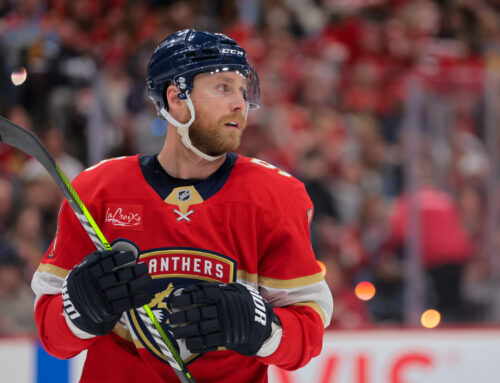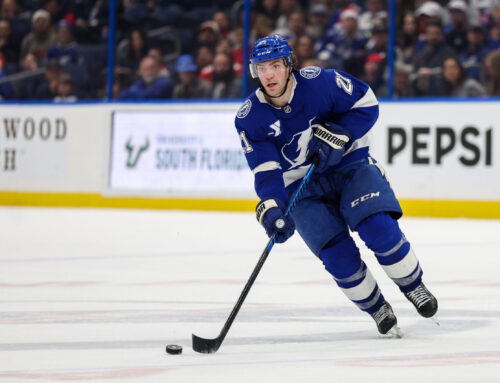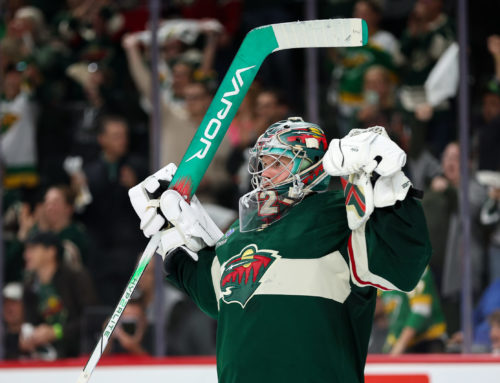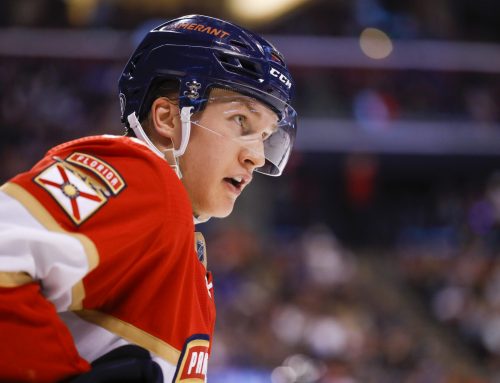
Like last week, today’s battle is between one player (Sean Monahan) who achieved early success but has yet to take that all-important next step, and another (Charlie Coyle) who had disappointed for his entire career but has broken out this season. Can Monahan improve; and if so, when might he turn a corner? Can Coyle stay productive for the rest of 2016-17; and where will he go from here? Let’s find out – Cage Match starts now!
Career Path and Contract Status
Monahan, 22, was drafted 6th overall in 2013 after consecutive 78 point OHL seasons. He stuck with Calgary for 2013-14 and finished with 34 points; but only 23 came in his final 62 games after 11 in his first 13 contests. As a sophomore his scoring nearly doubled (62 points), and this time he finished red hot (36 points in his final 37 games). His 2014-15 output plus chemistry with Johnny Gaudreau prompted poolies to expect Monahan to make a big leap in 2015-16. But while Gaudreau’s scoring jumped 22%, Monahan stayed in neutral – with only 63 points. For 2016-17, Monahan’s scoring pace is actually down despite 12 points in his last 11 games and it being his magical fourth year.
Coyle, who turns 25 in March, was grabbed 28th overall in 2010 by San Jose and, as forgotten by many poolies, was part of their 2011 deal to land Brent Burns. Coyle split 2011-12 between college hockey and juniors then posted 25 points 47 AHL games in 2012-13, showing the Wild enough to lock down a spot with the big club. Yet in his first three NHL seasons he never tallied even a point per other game. Last season he posted 42 points, which included surpassing the 20 goal threshold and a promising late season stretch of 11 points in 16 games. Even still, no one likely saw coming what he’s done so far in 2016-17, which has him on a 61 point full season scoring pace.
Monahan is on year one of a seven season deal with an annual cap hit of $6.375M, while Coyle is signed through 2020 at $3.2M per year. Thus, for now this is a mismatch in cap leagues.
Ice Time
|
Season |
Total Ice Time per game (rank among team’s forwards) |
PP Ice Time per game (rank among team’s forwards) |
SH Ice Time per game (rank among team’s forwards) |
|
2016-17 |
17:50 (S.M.) – 2nd 17:20 (C.C.) – 5th |
3:10 (S.M.) – 2nd 2:19 (C.C.) – 3rd |
0:32 (S.M.) – 8th 0:30 (C.C.) – 8th |
|
2015-16 |
19:10 (S.M.) – 2nd 17:18 (C.C.) – 4th |
3:14 (S.M.) – 2nd 1:54 (C.C.) – 6th |
0:48 (S.M.) – 8th 0:32 (C.C.) – 8th |
|
2014-15 |
19:37 (S.M.) – 1st 14:33 (C.C.) – 8th |
2:50 (S.M.) – 2nd 1:16 (C.C.) – 8th |
0:50 (S.M.) – 7th 0:03 (C.C.) – 13th |
|
2013-14 |
15:58 (S.M.) – 7th 17:05 (C.C.) – 5th |
2:05 (S.M.) – 4th 2:14 (C.C.)- 7th |
0:15 (S.M.) – 11th (tied) 0:08 (C.C.) – 11th |
Monahan’s data reminds us that a player’s ability to live up to his potential can depend on his Ice Time, which in turn depends on his coach. In four seasons when previous Flames coach Bob Hartley was at the helm, there were seven instances – including Monahan twice – of forwards averaging 19:10+ of Total Ice Time per game, plus six with 18:00-19:00 Total Ice Time. For 2016-17 no Calgary forward is averaging 19:10+ per game under new coach Glen Gulutzan, and only Gaudreau is over 18:00.
This is consequential, since the only Flames forward to post more than 47 points in any of the past four seasons despite getting under 18:00 of Ice Time per game was Gaudreau in 2014-15. There’s still a good amount of hockey to be played in 2016-17; but if Monahan’s Ice Time remains lower compared to past seasons, it could act as a barrier – if not a hard ceiling – to his production this season and beyond.
Then there’s the roller coaster Coyle has ridden – with his Ice Time starting right high from the get go in 2013-14, then dropping significantly in 2014-15, and then bouncing back up last season. Looking at his early data for 2016-17, there was a chance he might’ve seen his Ice Time drop again under new coach Bruce Boudreau, who only played him over 16:25 in two of the Wild’s first eight games. But Coyle scored six points, seemingly cementing a role in the top six.
Before poolies get too excited, there’s the reality that Coyle is producing much better this season despite nearly identical Total Ice Time as 2013-14 and 2015-16, and similar PP Time as 2015-16. And although his 17:20 per game leaves room to grow, it’s also low for a 60+ point player. We’ll have to look at his luck metrics very carefully.
Secondary Categories
|
Season |
PIMs (per game) |
Hits (per game) |
Blocked Shots (per game) |
Shots (per game) |
PP Points (per game) |
FOW (per game) |
|
0.25 (S.M.) 0.51 (C.C.) |
0.47 (S.M.) 1.25 (C.C.) |
0.27 (S.M.) 0.94 (C.C.) |
2.43 (S.M.) 1.88 (C.C.) |
0.22 (S.M.) 0.13 (C.C.) |
9.54 (S.M.) 0.92 (C.C.) |
|
|
2015-16 |
0.22 (S.M.) 0.19 (C.C.) |
0.47 (S.M.) 1.59 (C.C.) |
0.45 (S.M.) 0.74 (C.C.) |
2.43 (S.M.) 1.70 (C.C.) |
0.24 (S.M.) 0.07 (C.C.) |
10.95 (S.M.) 2.78 (C.C.) |
|
2014-15 |
0.14 (S.M.) 0.47 (C.C.) |
0.46 (S.M.) 1.67 (C.C.) |
0.52 (S.M.) 0.63 (C.C.) |
2.34 (S.M.)
📢 advertisement:
1.46 (C.C.) |
0.23 (S.M.) 0.03 (C.C.) |
11.17 (S.M.) 4.07 (C.C.) |
|
2013-14 |
0.10 (S.M.) 0.47 (C.C.) |
0.56 (S.M.) 1.53 (C.C.) |
0.36 (S.M.) 0.53 (C.C.) |
1.86 (S.M.) 1.90 (C.C.) |
0.09 (S.M.) 0.05 (C.C.) |
6.34 (S.M.) 2.65 (C.C.) |
For Monahan’s 2016-17, we see both his offensive-affecting metrics (i.e., SOG and PPPts) are virtually the same as they were in 2014-15 and 2015-16. And although his Ice Time is down, those numbers hint that he might be the victim of unsustainable bad luck.
What unfortunately is sustainable, are Monahan’s awful Hits, Blocks, and PIM. Among 64 forwards who played in 75+ games in each of the past three seasons, he’s the only one who failed to post either 20+ PIM, or 50+ Hits, or 50+ Blocks in any of the three campaigns. What’s especially concerning is the fact that he’s 22, since normally younger players are more apt to throw their body around. For example, seven other forwards didn’t have a single 50+ Hit or 50+ Block output in any of the past three seasons despite playing 75+ games per season – and lo and behold, each is over age 30. Therefore, not only is Monahan already terrible in these categories, it’s unlikely he’ll improve and he could get worse.
Conversely, Coyle is mostly a strong multi-cat contributor, particularly in Hits/Blocks. Were he to finish 2016-17 averaging 1+ Hit and 1+ Block per game, that would put him in rare territory, as only nine different full time forwards have hit both thresholds in one or more of the past three seasons, with only Ryan Getzlaf (twice) and Joe Pavelski (once) having done so while also posting 60+ points. But it’s not all good news for Coyle owners. His already lousy FOW are now downright terrible due to lining up with Eric Staal, who takes faceoffs as a wing. In leagues where Coyle is center-only eligible and which count FOW, he’s a major liability.
It’s not good news when it comes to Coyle’s SOG and PPPts. Although his PPPts are up, he’s on PP1 so they should be high – probably even higher. In fact, his hold on a PP1 spot might be tenuous, what with zero PPPts in his last 14 games.
His SOG have risen in 2015-16 and 2016-17, but they’re still below the two per game threshold I’ve pointed out is so important for a forward to be able to score even 60 points in a season. Remember – of 137 instances of 60+ point scoring in a season by a forward since 2013-14, only 14 averaged under two SOG per game in that season. And although nine of those 14 were centers, like Coyle, only two (Joe Thornton, David Krejci) potted over 20 goals, which is a number Coyle bested in 2015-16 and is on pace to top yet again in 2016-17.
Thus, Coyle isn’t a pass first center, but he also doesn’t shoot much. Perhaps he turns into a Krejci type; however, Krejci has more seasons of 2+ SOG per game than not, so Coyle still would have work to do. It’s something to keep an eye on, since it could mean the difference between Coyle becoming a true 60+ point player, or not.
Luck-Based Metrics
|
Season |
Personal Shooting Percentage |
Team Shooting % (5×5) |
IPP (5×5) |
IPP (5×4) |
Offensive Zone Starting % (5×5) |
|
2016-17 |
14.2% (S.M.) 13.5% (C.C.) |
6.28% (S.M.) 8.24% (C.C.) |
81.8% (S.M.) 79.3% (C.C.) |
58.8% (S.M.) 63.6% (C.C.) |
62.2% (S.M.) 48.4% (C.C.) |
|
2015-16 |
13.7% (S.M.) 15.0% (C.C.) |
10.18% (S.M.) 7.83% (C.C.) |
66.1% (S.M.) 73.7% (C.C.) |
64.5% (S.M.) 31.6% (C.C.) |
54.5% (S.M.) 51.8% (C.C.) |
|
2014-15 |
16.1% (S.M.) 9.2% (C.C.) |
8.17% (S.M.) 10.10% (C.C.) |
74.4% (S.M.) 60.0% (C.C.) |
55.2% (S.M.) 37.5% (C.C.) |
46.8% (S.M.) 44.9% (C.C.) |
|
2013-14 |
15.7% (S.M.) 9.0% (C.C.) |
8.51% (S.M.) 7.64% (C.C.) |
72.7% (S.M.) 66.7% (C.C.) |
46.2% (S.M.) 30.8% (C.C.) |
54.6% (S.M.) 56.6% (C.C.) |
The most glaring number here is Monahan’s 6.28% Team Shooting %, which not only is considerably below the normal 9.0% for forwards but would’ve put him 117th among 125 forwards who played 1000+ minutes at 5×5 last season. Seeing this alongside Monahan’s steady SOG and PPPts and 62.2% OZ% strongly suggests he’s suffering from especially bad luck for 2016-17.
The concern, however, is where would Monahan be if his luck wasn’t bad? Probably right near where he was the past two seasons. In other words, although he’s still only 22, the picture that’s unfolding isn’t necessarily that of a 70+ point player. Poolies have to face that with each passing year where Monahan doesn’t make a leap, it become less likely that he makes the leap at all.
Coyle’s 2016-17 numbers aren’t concerning overall. His personal shooting % is on par with 2015-16. Plus, his 5×5 Team Shooting % is actually a bit low. His higher 5×5 IPP is reasonable since it had risen above 70% last season. In fact, the only possibly worrisome number is his 5×4 IPP, which is nearly double any past season. But there’s at least a partial explanation/justification in that Coyle is finally seeing time on PP1. Also, to the extent his 5×4 IPP might drop to 50%, or even a bit lower, that would mean only a couple of points difference over the course of an entire season.
Who Wins?
For one-year points only leagues, Monahan wins because of his past track records of production and finishing strong, plus his extremely low 5×5 Team Shooting % alongside healthy SOG and PPPt rates suggest he’s due for a ROS boost. That’s not to say the bottom will fall out for Coyle; however, his sub-two per game SOG rate is worrisome, especially since his recent output has been way down, as he had only 15 total SOG in 13 January games.
In multi-cat one-year leagues, it depends on categories. Although Coyle’s lousy FOW can’t as easily be boosted by contributions from other positions ala PIM, Hits and Blocks (where Monahan is terrible), the per player impact in FOW is arguably less than it is in those categories. Long story short – each player could be poison in certain multi-cat leagues, so be careful.
For points-only keepers I’m picking Monahan again. He’s more proven, plus seemingly stapled to Johnny Gaudreau, and snake bitten by very bad luck for 2016-17 thus far. In contrast, Coyle has his persistent SOG rate issue and plays for a team with more balanced scoring and Ice Time. Also Coyle’s breakout has resulted in his cost rising, which could lead to an buy high situation through 2016-17 and into this summer, while the price for Monahan, despite his recent hot stretch, might not be lower for a while (if ever again) as compared to now. If – either now or this summer – you can get Monahan in a keeper for a price at or below his 60-65 point downside, grab him.
One Comment
Leave A Comment
You must be logged in to post a comment.





 EDM
EDM STL
STL ANA
ANA BUF
BUF DET
DET NYI
NYI MIN
MIN CAR
CAR CBJ
CBJ T.B
T.B

I’m loving Coyle in my points-only keeper. Grabbed him in early Aug, 2016 when I heard he’d start the year playing with Parise and Staal. Got him for Sheahan and Komarov so I’d call that a win.